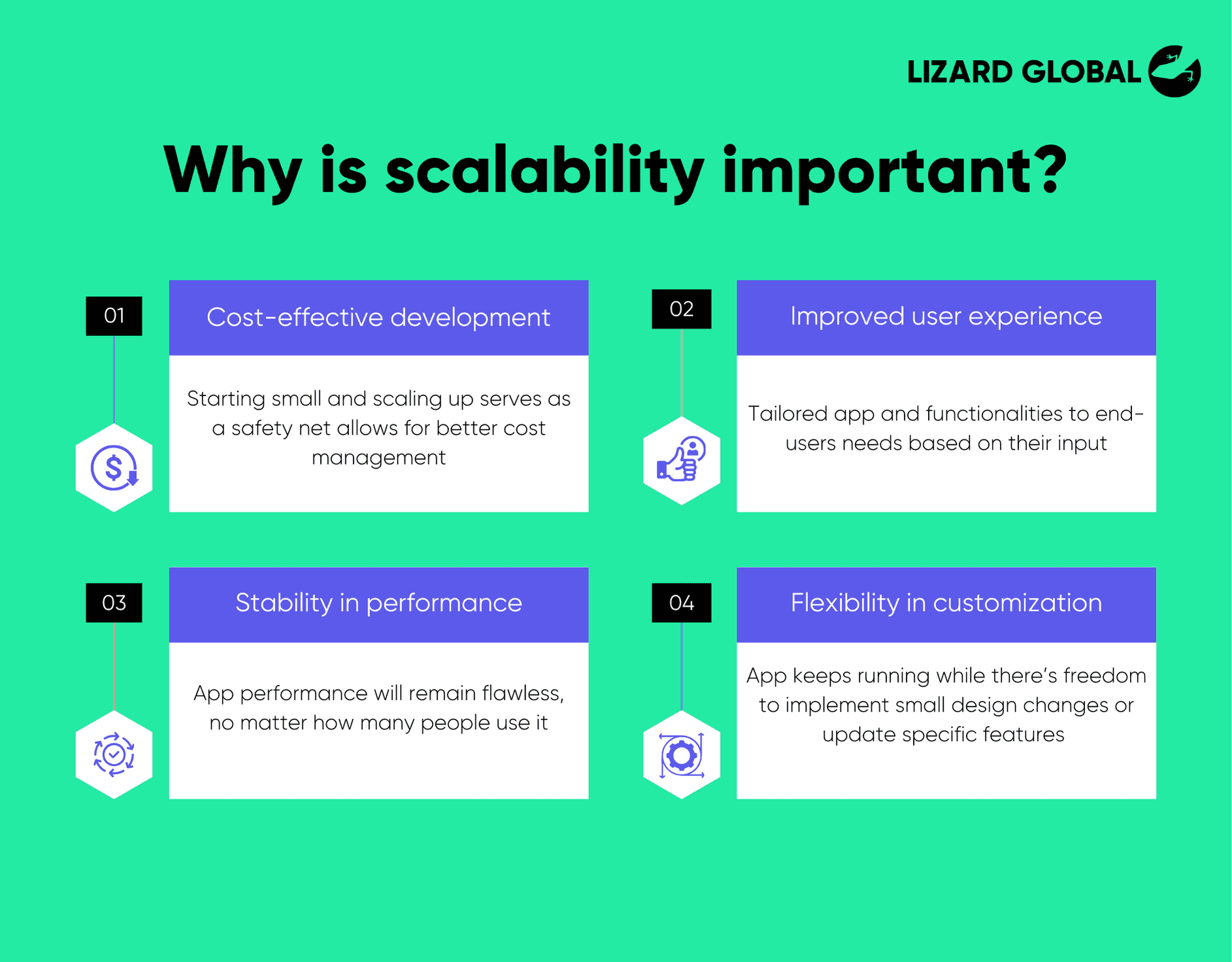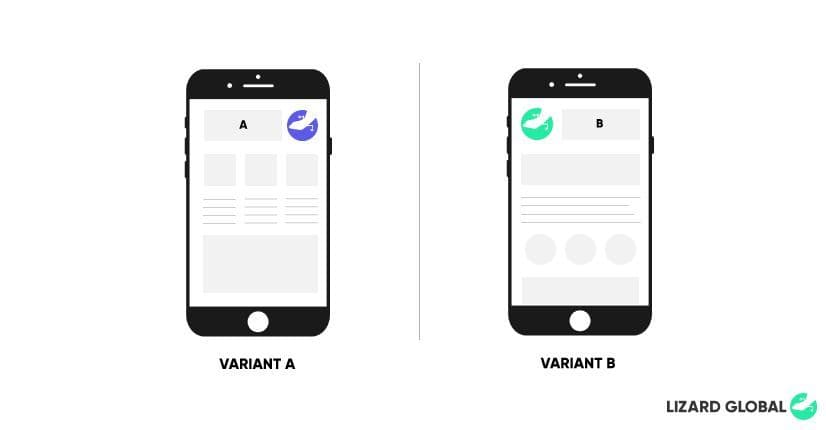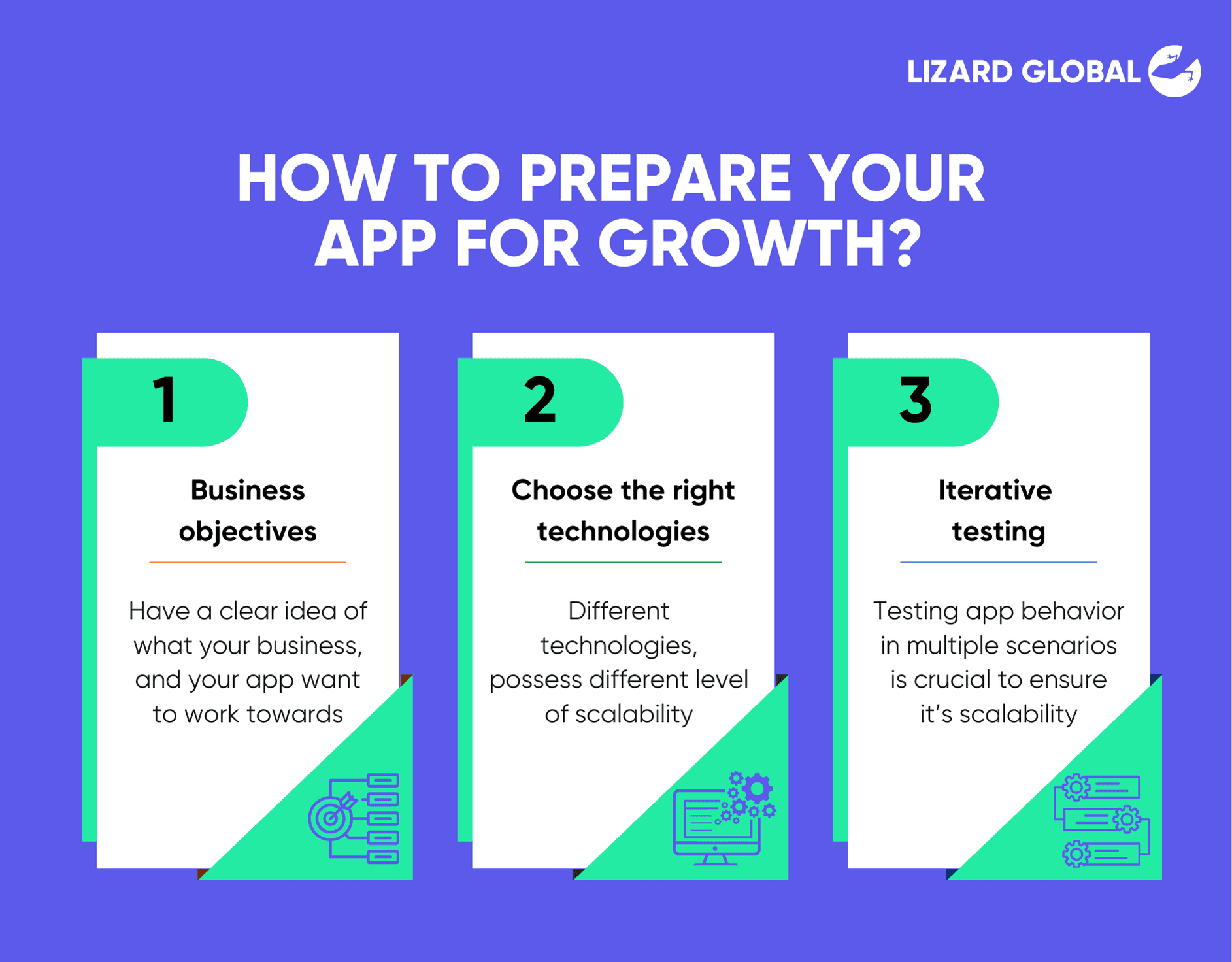Scalability
App Development
+ 7 more ...
What Is Scalability in App Development & Why Is It Important?
16 Jul 2024
by Lotte, Digital Content Specialist & Nadiy, Content Writer
16 Jul 2024
by Lotte, Digital Content Specialist & Nadiy, Content Writer
Scalability
App Development
Growth
Business Growth
User Base
Customer Acquisition
Performance
Load Testing
Performance Testing
What Is Scalability in App Development & Why Is It Important?
Table of contents
Contact us
We will get back to you in the next 48 hours.

The scalability of your mobile application or web application plays an important role in the growth potential of your business. But what is scalability exactly? And how do we implement it in the development of your app?
key takeaways
As an entrepreneur, your main goal is related to the growth of your business. Naturally, every business owner hopes that their app will become a hit on the market at some point. Success entails a steady growth of your user base, which is inextricably linked to higher pressure on your app’s performance. After all, more people using your app means more data being transferred, more backend processes running, and more space needed to store all that data. When your application isn’t able to deal with all this information, a crash is inevitable. Now don’t get confused between app maintenance and scalability.
When creating an application, it’s essential to keep future growth in mind. This is where scalability comes into play. This blog tells you all you need to know about scalability in app development, and why it’s so important to prepare your application for growth in an early stage of development.
What is scalability in applications?
App development is a complex and time-consuming process. In order to make the process as efficient and fast as possible without losing quality, our developers implement specific agile strategies to work towards a product that’s perfectly aligned with the needs of the end-user. It is wise to start small when creating a digital product rather than constructing a full-fledged version from the start. Instead of offering your customers something they might not like, you can build a simpler version of the app and test it out among end-users. This is where the concept of the MVP, or Minimum Viable Product comes from. You start by putting together a simple version of the product, test it out among end-users, and upgrade the solution with the feedback from these users.

You might wonder what that has to do with scalability, and the answer is pretty simple: everything. Scalability has everything to do with your app’s ability to grow and evolve together with your company, depending on the demand. A scalable app is, therefore, an application that consists of a flexible architecture and in which additional features can be added without affecting the overall performance.
Why does scalability matter?
As mentioned before, when you have your app developed, future growth will likely be one of its main objectives. This means that, if all goes well, your app will be used by an increasing number of people. What you want to avoid is to have to completely start from scratch soon after developing your app because it isn’t built to accommodate an influx of new users. Not only would this be a major waste of time, effort, and financial investment, it also causes you to lose the user base you’ve been working to build for so long. All this could have been easily avoided if your app was built with scalability in mind.

Besides the fact that a highly scalable application ensures sustainable growth of your user base and business without facing drawbacks in performance, there are much more benefits to high scalability:
Cost-effective development
The approach of starting small and scaling up serves as a safety net that also allows you to save a considerable amount of money. Begin with a product that has just the right amount of functionalities, the MVP. Show it to your users, collect valuable feedback, and improve from there. You can save critical resources this way because your product's expansion is based on reliable data, and you're not merely delivering a fully-developed product to your customers that eventually doesn’t do it for them.
Focus areas:
- Optimizing Resources: Scalable architectures allow for efficient use of resources, scaling up when demand increases and scaling down during off-peak times to save costs.
- Future-Proofing: Investing in scalability upfront can prevent costly and complex overhauls later as the app grows.
Want to find out how much it costs to build your dream app or web app?
Improved user experience
Developing an application based on the strategy of an MVP allows you to tailor your app and its functionalities to the needs of your end-users, based on their input. This implies that, when you scale the app based on what your customers need, you can continuously improve and adapt the UX when it comes to new features or modifications, while also ensuring that the app runs smoothly as the number of users grows.
Focus areas:
- Consistent Quality: A scalable app ensures a consistent user experience regardless of the number of users, leading to higher user satisfaction and retention.
- Quick Load Times: Scalability helps maintain quick load times, which is critical for user engagement and reducing bounce rates.
Stability in performance
An improved user experience is without a doubt, the most crucial benefit of scalable development. When you design and develop your application with scalability in mind, you can be assured that the application is able to deal with a surge in users. Whereas a non-scalable application would likely show a decrease in loading time or even crash completely, your app’s performance will remain flawless, no matter how many people use your app. Which, in its turn, positively impacts the overall user experience.
Focus areas:
- Maintaining Speed and Efficiency: A scalable app maintains fast response times and efficient performance, even as the load increases.
- Reducing Downtime: Scalability reduces the risk of downtime, ensuring the app remains available and reliable for users.
Flexibility in customization
In case you want to add a new feature or a specific improvement to your application, high scalability allows you to customize your app, making sure it stays aligned with your business objectives and the input of your users. The basis of the app keeps running, while you get the freedom to implement small design changes or update specific features without having to start from scratch. With a scalable application, you can also apply the practice of A/B testing to try out small changes in your design or in a certain functionality without having to rewrite the entire code. This allows you to continuously add value to your customers quickly and efficiently.
Focus areas:
- Evolving Technology: Scalability allows for easier integration of new technologies and features, ensuring the app remains modern and competitive.
- Customizability: Scalable systems are often more modular, allowing for easier updates and customizations to meet evolving user needs.

How to prepare your app for growth?

Scalability involves planning and preparation because every business has its own needs and objectives. Together with your development partner, you’ll have to dive into your goals, available resources, suitable technologies and a solid testing strategy.
Business objectives
Before diving into the development of your application, you’ll need to have an idea of where you, your business and your app want to work towards. For example, it could be that your business is active in a very niche market, or your digital solution is meant for a specific group of users and won’t be commercially available in all app stores. In this case, your main objective could be to automate and optimize the workflows within the boundaries of your own company, rather than becoming the number one application on the market. These objectives have an impact on the level of scalability your application needs to possess in order to keep functioning in the long term.
Focus areas:
- Define Scalability Requirements: Determine the expected growth in users, data, and transactions to understand the scalability requirements.
- Modular Architecture: Design a modular and component-based architecture that allows for easy scaling of individual components.
- Microservices: Consider using microservices architecture, where the app is divided into smaller, independently deployable services that can be scaled individually.
Choose the right technologies
If you consider scalability during the planning stage, you’re already one step ahead. When you begin the development of your app, it’s essential that special attention is paid to the technologies that are being selected. Different technologies, such as programming languages, databases and frameworks possess a different level of scalability. For example, Node.js is the go-to backend environment for flexibility and scalability, and it can be used for both web app and mobile app development. This is one of the reasons our developers at Lizard Global have implemented the versatile MERN tech stack, including technologies that are designed to be highly scalable and customizable.
Focus areas:
- Scalable Databases: Use databases that support horizontal scaling, such as NoSQL databases (e.g., MongoDB, Cassandra) or sharded SQL databases.
- Load Balancing: Implement load balancers to distribute incoming traffic evenly across servers, preventing any single server from becoming a bottleneck.
- Cloud Services: Utilize cloud platforms (e.g., AWS, Azure, Google Cloud) that offer scalable infrastructure and services.
Contact us today via WhatsApp to get in touch with one of our experts to find the perfect digital solution for your business!
Iterative testing
Testing your app's behavior in multiple scenarios is the most crucial component of ensuring it is scalable. There are several methods for determining whether your software has the ability to keep up with user growth, the most important of which are load testing and performance testing. With load testing, we increase the demand on the application and see what impact it has on the performance of your app in case a lot of people try to access it at once. While load testing tries to see how many users it can accommodate before it impacts the overall performance, performance testing entails the analysis of specific performance metrics, such as loading speed, response time and stability under different circumstances.
Focus areas:
- Caching: Implement caching mechanisms (e.g., Redis, Memcached) to reduce database load and speed up data retrieval.
- Asynchronous Processing: Use asynchronous processing for tasks that don’t need immediate completion, reducing the load on the main application thread.
- Efficient Code: Write efficient, clean code that minimizes resource usage and can handle increased load.
Need a hand?
At Lizard Global, scalability plays an important role in our development processes. Because we’ve worked on projects for large organizations with high growth potential, we’re experienced in creating solutions that are fully prepared for a higher demand in case your solution takes off.

In case you’re planning to develop your scalable application, you can now sign up for a FREE consultancy session with our experts via the contact form on our website! We’d love to hear about your ideas and answer any questions you may have regarding a digital partnership with Lizard Global and the development of your digital solution.
Join 2000+ subscribers
Stay in the loop with everything you need to know

The scalability of your mobile application or web application plays an important role in the growth potential of your business. But what is scalability exactly? And how do we implement it in the development of your app?
As an entrepreneur, your main goal is related to the growth of your business. Naturally, every business owner hopes that their app will become a hit on the market at some point. Success entails a steady growth of your user base, which is inextricably linked to higher pressure on your app’s performance. After all, more people using your app means more data being transferred, more backend processes running, and more space needed to store all that data. When your application isn’t able to deal with all this information, a crash is inevitable. Now don’t get confused between app maintenance and scalability.
When creating an application, it’s essential to keep future growth in mind. This is where scalability comes into play. This blog tells you all you need to know about scalability in app development, and why it’s so important to prepare your application for growth in an early stage of development.
What is scalability in applications?
App development is a complex and time-consuming process. In order to make the process as efficient and fast as possible without losing quality, our developers implement specific agile strategies to work towards a product that’s perfectly aligned with the needs of the end-user. It is wise to start small when creating a digital product rather than constructing a full-fledged version from the start. Instead of offering your customers something they might not like, you can build a simpler version of the app and test it out among end-users. This is where the concept of the MVP, or Minimum Viable Product comes from. You start by putting together a simple version of the product, test it out among end-users, and upgrade the solution with the feedback from these users.

You might wonder what that has to do with scalability, and the answer is pretty simple: everything. Scalability has everything to do with your app’s ability to grow and evolve together with your company, depending on the demand. A scalable app is, therefore, an application that consists of a flexible architecture and in which additional features can be added without affecting the overall performance.
Why does scalability matter?
As mentioned before, when you have your app developed, future growth will likely be one of its main objectives. This means that, if all goes well, your app will be used by an increasing number of people. What you want to avoid is to have to completely start from scratch soon after developing your app because it isn’t built to accommodate an influx of new users. Not only would this be a major waste of time, effort, and financial investment, it also causes you to lose the user base you’ve been working to build for so long. All this could have been easily avoided if your app was built with scalability in mind.

Besides the fact that a highly scalable application ensures sustainable growth of your user base and business without facing drawbacks in performance, there are much more benefits to high scalability:
Cost-effective development
The approach of starting small and scaling up serves as a safety net that also allows you to save a considerable amount of money. Begin with a product that has just the right amount of functionalities, the MVP. Show it to your users, collect valuable feedback, and improve from there. You can save critical resources this way because your product's expansion is based on reliable data, and you're not merely delivering a fully-developed product to your customers that eventually doesn’t do it for them.
Focus areas:
- Optimizing Resources: Scalable architectures allow for efficient use of resources, scaling up when demand increases and scaling down during off-peak times to save costs.
- Future-Proofing: Investing in scalability upfront can prevent costly and complex overhauls later as the app grows.
Want to find out how much it costs to build your dream app or web app?
Improved user experience
Developing an application based on the strategy of an MVP allows you to tailor your app and its functionalities to the needs of your end-users, based on their input. This implies that, when you scale the app based on what your customers need, you can continuously improve and adapt the UX when it comes to new features or modifications, while also ensuring that the app runs smoothly as the number of users grows.
Focus areas:
- Consistent Quality: A scalable app ensures a consistent user experience regardless of the number of users, leading to higher user satisfaction and retention.
- Quick Load Times: Scalability helps maintain quick load times, which is critical for user engagement and reducing bounce rates.
Stability in performance
An improved user experience is without a doubt, the most crucial benefit of scalable development. When you design and develop your application with scalability in mind, you can be assured that the application is able to deal with a surge in users. Whereas a non-scalable application would likely show a decrease in loading time or even crash completely, your app’s performance will remain flawless, no matter how many people use your app. Which, in its turn, positively impacts the overall user experience.
Focus areas:
- Maintaining Speed and Efficiency: A scalable app maintains fast response times and efficient performance, even as the load increases.
- Reducing Downtime: Scalability reduces the risk of downtime, ensuring the app remains available and reliable for users.
Flexibility in customization
In case you want to add a new feature or a specific improvement to your application, high scalability allows you to customize your app, making sure it stays aligned with your business objectives and the input of your users. The basis of the app keeps running, while you get the freedom to implement small design changes or update specific features without having to start from scratch. With a scalable application, you can also apply the practice of A/B testing to try out small changes in your design or in a certain functionality without having to rewrite the entire code. This allows you to continuously add value to your customers quickly and efficiently.
Focus areas:
- Evolving Technology: Scalability allows for easier integration of new technologies and features, ensuring the app remains modern and competitive.
- Customizability: Scalable systems are often more modular, allowing for easier updates and customizations to meet evolving user needs.

How to prepare your app for growth?

Scalability involves planning and preparation because every business has its own needs and objectives. Together with your development partner, you’ll have to dive into your goals, available resources, suitable technologies and a solid testing strategy.
Business objectives
Before diving into the development of your application, you’ll need to have an idea of where you, your business and your app want to work towards. For example, it could be that your business is active in a very niche market, or your digital solution is meant for a specific group of users and won’t be commercially available in all app stores. In this case, your main objective could be to automate and optimize the workflows within the boundaries of your own company, rather than becoming the number one application on the market. These objectives have an impact on the level of scalability your application needs to possess in order to keep functioning in the long term.
Focus areas:
- Define Scalability Requirements: Determine the expected growth in users, data, and transactions to understand the scalability requirements.
- Modular Architecture: Design a modular and component-based architecture that allows for easy scaling of individual components.
- Microservices: Consider using microservices architecture, where the app is divided into smaller, independently deployable services that can be scaled individually.
Choose the right technologies
If you consider scalability during the planning stage, you’re already one step ahead. When you begin the development of your app, it’s essential that special attention is paid to the technologies that are being selected. Different technologies, such as programming languages, databases and frameworks possess a different level of scalability. For example, Node.js is the go-to backend environment for flexibility and scalability, and it can be used for both web app and mobile app development. This is one of the reasons our developers at Lizard Global have implemented the versatile MERN tech stack, including technologies that are designed to be highly scalable and customizable.
Focus areas:
- Scalable Databases: Use databases that support horizontal scaling, such as NoSQL databases (e.g., MongoDB, Cassandra) or sharded SQL databases.
- Load Balancing: Implement load balancers to distribute incoming traffic evenly across servers, preventing any single server from becoming a bottleneck.
- Cloud Services: Utilize cloud platforms (e.g., AWS, Azure, Google Cloud) that offer scalable infrastructure and services.
Contact us today via WhatsApp to get in touch with one of our experts to find the perfect digital solution for your business!
Iterative testing
Testing your app's behavior in multiple scenarios is the most crucial component of ensuring it is scalable. There are several methods for determining whether your software has the ability to keep up with user growth, the most important of which are load testing and performance testing. With load testing, we increase the demand on the application and see what impact it has on the performance of your app in case a lot of people try to access it at once. While load testing tries to see how many users it can accommodate before it impacts the overall performance, performance testing entails the analysis of specific performance metrics, such as loading speed, response time and stability under different circumstances.
Focus areas:
- Caching: Implement caching mechanisms (e.g., Redis, Memcached) to reduce database load and speed up data retrieval.
- Asynchronous Processing: Use asynchronous processing for tasks that don’t need immediate completion, reducing the load on the main application thread.
- Efficient Code: Write efficient, clean code that minimizes resource usage and can handle increased load.
Need a hand?
At Lizard Global, scalability plays an important role in our development processes. Because we’ve worked on projects for large organizations with high growth potential, we’re experienced in creating solutions that are fully prepared for a higher demand in case your solution takes off.

In case you’re planning to develop your scalable application, you can now sign up for a FREE consultancy session with our experts via the contact form on our website! We’d love to hear about your ideas and answer any questions you may have regarding a digital partnership with Lizard Global and the development of your digital solution.
Join 2000+ subscribers
Stay in the loop with everything you need to know
FAQs

What are the best practices for database scalability?
What is autoscaling, and how does it work?
What are the common challenges in achieving scalability?
How important is scalability in the early stages of app development?
How do you measure the scalability of an application?







